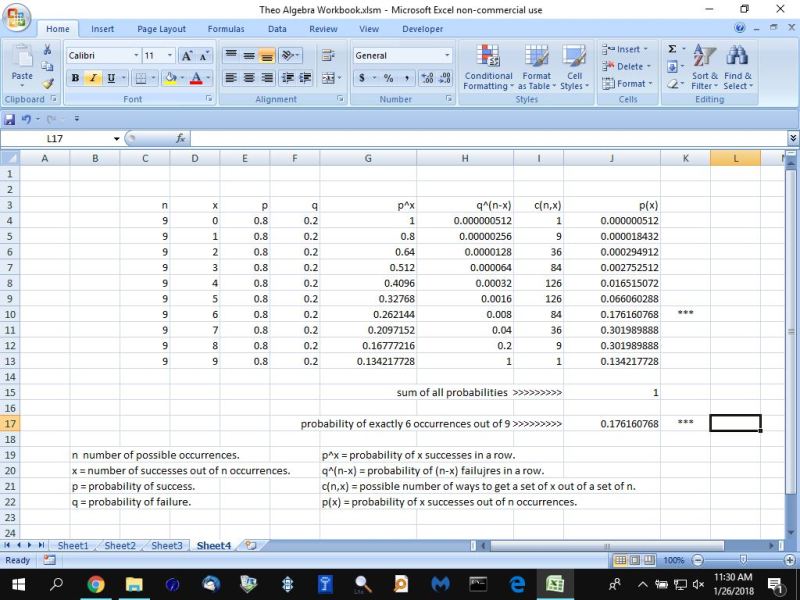Question 1107603: Read the question carefully. Sample question: “80% of people who purchase pet insurance are women. If 9 pet insurance owners are randomly selected, find the probability that exactly 6 are women.”
I am trying to have this problem broken down. Can you please explain how 84 came from 9! / (9-6)!6!
Found 2 solutions by Theo, addingup:
Answer by Theo(13342)   (Show Source): (Show Source):
You can put this solution on YOUR website! p(x) = p^x * q^(n-x) * c(n,x)
p(x) is the probability of exactly occurrences.
n = number of total occurrences.
p = probability of success on one trial.
q = probability of failure on one trial.
c(n,x) = number of ways you can get a set of 8 out of a set of n.
n = 9
x = 6
p = .8
q = 1 - .8 = .2
c(9,6) = 9! / (6! * 3!) = 84
p(6) = .8^6 * .2^3 * 84 = .176160768
the sum of all probabilities must be equal to 1.
the following excel spreadsheet shows this to be true.
look below the spreadsheet for the answer to your question.

Can you please explain how 84 came from 9! / (9-6)!6!
c(n,x) = n! / (x! * (n-x)!)
in your problem, this becomes c(9,6) = 9! / (6! * (9-6)!)
simplify this to get c(9,6) = 9! / (6! * 3!)
simplify further to get c(9,6) = (9*8*7*6*5*4*3*2*1) / (6*5*4*3*2*1 * 3*2*1)
you have a block of (6*5*4*3*2*1) in the numerator and the denominator that cancels out and you are left with c(9,6) = (9*8*7) / (3*2*1)
the 3 in the denominator goes into the 9 in the numerator 3 times.
the 2 in the denominator goes into the 8 in the numerator 4 times.
you are left with c(9,6) = 3*4*7 which is equal to 12 * 7 which is equal to 84.
Answer by addingup(3677)   (Show Source): (Show Source):
You can put this solution on YOUR website! 9! = 1 x 2 x 3 x 4 x 5 x 6 x 7 x 8 x 9
(9-6)! = 3! = 1 x 2 x 3
6! = 1 x 2 x 3 x 4 x 5 x 6
----------------------------
A factorial (indicated by the sign !) means the product of all the whole numbers from 1 to n, so it's 1 x 2 x 3 x .... n
Look at your calculator and see if it has a factorial (!) key (mine does). If not, find the factorials then do the rest of the operations and if you do them right you will get 84.
NOTE: You don't have to do 1 times 2, skip the 1. Any number multiplied by 1 = the number, so there's no point doing 1 x 2 = 2. Just begin with 2 x 3.
|
|
|